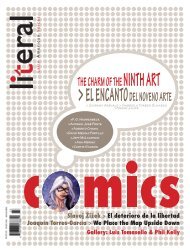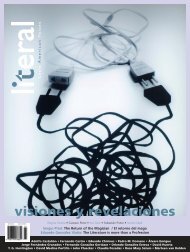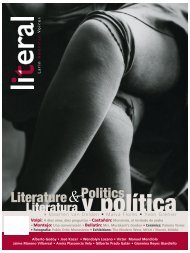Richard Serra - Literal
Richard Serra - Literal
Richard Serra - Literal
You also want an ePaper? Increase the reach of your titles
YUMPU automatically turns print PDFs into web optimized ePapers that Google loves.
The Excessive Imagination<br />
n Socorro Venegas / Interview with Francisco Hinojosa<br />
Translated to English by Debra D. Andrist<br />
Mexican writer Francisco Hinojosa can presume to<br />
have impacted thousands of readers who have read<br />
his work since they were young children. And to have<br />
impacted them, now grown, to the point where they<br />
buy his books again on the pretext of reading them to<br />
some niece or nephew or younger sibling this time.<br />
Another facet of Francisco Hinojosa, neither less<br />
original nor entertaining, is his excellent adult literature.<br />
In the terrain of children’s fi ction, Juan Villoro<br />
has baptized Hinojosa “the Brother Grimm;” in his<br />
story production for adults, the Mexican literary critic,<br />
Christopher Dominguez Michael, has christened him<br />
the most original of the Mexican storytellers and one<br />
of the “most delightfully-biting wits” of contemporary<br />
literature in the Spanish language.<br />
This interview took place in Cuernavaca, only an<br />
hour from Mexico City, a place where he has lived for<br />
some years and where he shares life and literature with<br />
his wife, the talented and renowned poet, María Baranda,<br />
and with a growing community of artists and<br />
writers who seem to found something of the same<br />
fervent creative atmosphere in this city that inspired<br />
Malcolm Lowry to write his novel, Below the Volcano.<br />
***<br />
Socorro Venegas: What motives are there, what<br />
changes the creative process, when you write for a<br />
child and when you do it for an adult?<br />
Francisco Hinojosa: There’s a sense of enthusiasm.<br />
I believe that when I write for children, I truly am a<br />
child, I put myself in the role of reader and that’s what<br />
makes the difference. And, I laugh distinctly differently<br />
in the case of writing for children rather than how I<br />
laugh when I write stories for adults.<br />
SV: One time you said, “After so many years, I’ve<br />
got it straight that if I write a story for children and<br />
they don’t like it, or it doesn’t interest them, it’s my<br />
fault. Conversely, if I do something for adults, and they<br />
don’t like it, it’s the reader’s fault. Can you expand on<br />
this idea?<br />
FH: I believe that when a child reads a story that<br />
doesn’t interest him, that has a bad beginning, that<br />
doesn’t correspond to his sphere of interest, that he<br />
doesn’t like, that doesn’t make him laugh, the one who<br />
is failing is the author who didn’t fi nd out how to en-<br />
38 4 L ITERAL. LATIN AMERICAN VOICES • FALL, 2007<br />
gage that child reader until he’s well into the story. This<br />
is why I say that, when a child reader isn’t interested in<br />
the story and tosses it away, the author has died.<br />
There is a much higher level of necessary reader engagement<br />
in the story than in the novel. A reader can<br />
easily leave off reading due to this. That’s why I think<br />
that, when a reader abandons the reading, it’s because<br />
he didn’t fi nd out how to maintain this engagement. In<br />
that case, the author hasn’t necessarily failed.<br />
SV: The readers of your children’s stories have consolidated<br />
your status as one of the most read authors.<br />
How have you done with the readers of your stories<br />
for adults?<br />
FH: Response is very meager. I believe that, in the<br />
case of children, I am an author who gets printed a lot,<br />
who gets read a lot, that’s unquestioned, the numbers<br />
support it. But the numbers also say something else<br />
when they refer to the books that I have published for<br />
adults. It’s an absolute fact that the three books of my<br />
books published by Tusquets have sold around 15 copies<br />
in the past year. That says something about the<br />
story, that in general, as a genre, it doesn’t get read<br />
much. I believe that I am an author, in the case of literature<br />
for adults, much more for a specifi c audience, for<br />
a particular kind of reader, and almost always, as I have<br />
told those few readers among adolescents, that this<br />
is something that pleases me a lot. And, I don’t care<br />
about being much more widely read.<br />
SV: Returning to children’s literature, at some<br />
conferences, you have referred to the experience that<br />
North American editors of children’s literature have a<br />
list of prohibited topics.<br />
FH: Yes, there is a kind of requirement that the authors<br />
of books for children must be politically correct.<br />
The academically-oriented system doesn’t accept certain<br />
books that contain topics not considered appropriate<br />
for children, like war, violence, drugs, but also<br />
among those prohibited topics are rock music, candies,<br />
dinosaurs, excessive fantasy, and one that surprised me<br />
a lot, in one publishing proposal made to me by some<br />
editors, houses with swimming pools. The idea is that<br />
a fi cticious house with a pool in a story may make<br />
some child reader who doesn’t live in a house with a<br />
pool feel bad. I believe that, if this concept were true,<br />
practically all classic literature would be banned.






